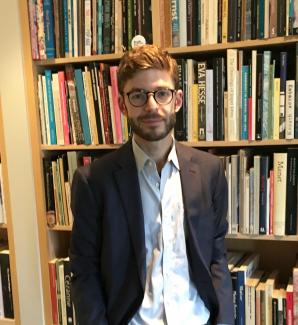
A month after jihadists had caged and beaten him using a slab of wood studded with nails that punctured and gnashed his flesh, and two years before he would affix two nooses from his ceiling — one for himself and one for his starving dog — he drank all the philosopher Sadiq Jalal al-Azm’s wine.
It was January 2013. The Fighter had arrived in Beirut two weeks earlier, smuggled across the border in the back of a car. The group of activists who had organized his escape from Syria had installed him in a small room in the Lebanese capital, dirty and crowded with others fleeing the war. “You promised me I would not be humiliated,” he told the activist who had done the most to organize his escape, over the phone. “I have no money and live like a dog.” She made some calls. Soon after, an old man escorted the Fighter to an empty apartment on Bliss Street. He told him not to leave the apartment and gave the Fighter $300 from its absent owner.
The Fighter lived on alcohol, and it emptied his pockets. The expense of Beirut, in comparison to Damascus, shocked him. Unlike the provisional dwellings filled with sympathizers to the revolution that he’d known in Barzeh, a Damascus suburb, the new apartment’s solitary grandeur bewildered him. Multitudes of books — shelved between big windows, piled beside white walls, and stacked throughout a living room large enough to be partitioned into three distinct areas — gave the space a studious tranquility. He stared at books written in languages he did not understand. He named his new home The Library.
Yet The Library offered no respite. He slept in the master bedroom and dressed in the owner’s clothes, wearing a beige jacket he would later keep. He left the apartment when the alcohol he consumed compelled him, or whenever he ran out of alcohol and needed to stock more. He left when the boredom, the static nature of passing time in an unchanging space, and the memories bequeathed by stillness, memories distant and recent, forced him outside. He took a coffee in a café on the street. He counted his diminishing funds. When he returned to the apartment, he would wander its rooms, a bottle always in hand. He leafed through the books and thought back to the school in his town, Masyaf, and of the teachers there who beat him. He thought of his father, who beat him. He remembered moments from his childhood, skipping classes with his friends and sneaking into an unoccupied villa in the forest and swimming in its pool only to find out a gardener had stolen their clothes, forcing them to slink back to town in their underwear. He counted the four books he had read in his entire life. He remained skeptical of the knowledge the volumes around him could impart.
Read the entire story HERE
